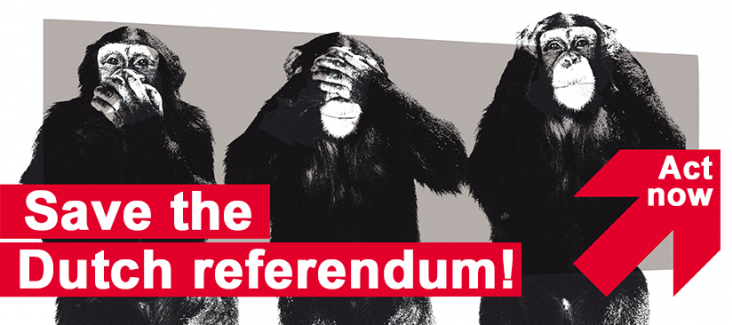“Every Dutch citizen is affected by the survival of the referendum and has the right to have a say. We therefore call on as many Dutch people as possible to join our lawsuit against the government," says Niesco Dubbelboer of Meer Democratie, “People are able to add their names as associates to the lawsuit on our website.”
Prime Minister Rutte’s new government last year decided it wants to repeal a three-year old law that makes it possible to for citizens to initiate a non-binding referendum. The Dutch parliament yesterday approved this repeal law with a very tight majority. The law entails an extremely controversial specification, which retroactively forbids holding a referendum on the Referendum Repeal Law itself.
It is this stipulation that Meer Democatie contests in its lawsuit. The current Dutch referendum law states that 300.000 citizens can initiate an advisory, corrective referendum on any law after it has been approved by the parliament. By including an amendment that prohibits this in the repeal law, the Dutch government is acting illegally, argues Meer Democratie.
“The Cabinet is placing itself above the law by trying to dismiss a law which states precisely that any law can be the subject of a popular referendum. In doing so, it undermines the rule of law for purely political motives,” says Arjen Nijeboer, of Meer Democratie and board member of Democracy International.
The Dutch referendum law is only three years old and so far, only one referendum, on the EU-Ukraine Association Agreement, has taken place in the Netherlands. The Association Agreement was rejected in a referendum in 2016, leaving a particular bitter aftertaste in Dutch politics. This single negative experience has led the Dutch Government to conclude that the right to initiate a referendum has to be rescinded. In doing so, the Netherlands become the only country to have ever abolished the referendum in postwar Europe, along with the German Democratic Republic.
“It is truly unseen that a modern, democratic country curbs the rights of its citizens in such an abrupt and severe way. The Dutch citizens are being punished based on a single experience,” says Daniel Schily, member of the board of Democracy International. “Allowing citizens to initiate a referendum on legislation they do not support is an important complement to representative democracy and ensures that citizens have a voice, even between elections. Citizens should have the right and possibility to correct policy they disagree with, especially where it concerns how they themselves can participate in politics and are represented.”
---------
Meer Democratie is a partner organization of Democracy International and fights for direct democracy and citizen participation in the Netherlands.

